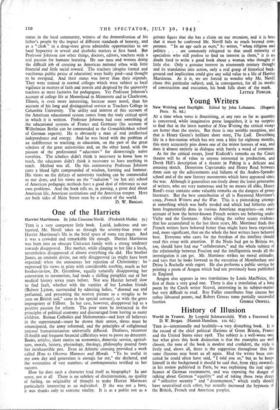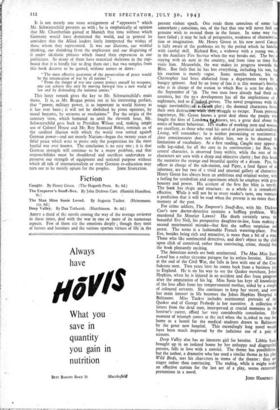History of Illusion
Tins is—intentionally and healthily—a, very disturbing book. It is the record of the chief political illusions of Great Britain, France and the United States since 1918. The subject is a well-worn one but what gives this book distinction is that the examples are well chosen, the tone of the book is modest and confident, the style is lively and, above all, there is the suggestion throughout that the same illusions may beset us all again. Had the writer been con- ceited he could often have said, "I told you so," but as he keeps himself in the background it should be said that, from 033 onwards, in his review published in Paris, he was explaining the real signi- ficance of German rearmament, and was exposing the danger of talking about German " equality " and of taking those twin drugs of "collective security" and "disarmament," which really should have neutralised each other, but actually increased the hypnosis of the British, French and American peoples.
It is not merely one more arraignment of " appeasers " which Mr. Schwarzschild presents us with ; he is emphatically of opinion that Mr. Chamberlain gained at Munich that time without which Germany would have dominated the world, and in general he considers that the Allied leaders fairly interpreted the wishes of those whom they represented. It was our illusions, our wishful thinking, our shrinking from the unpleasant and our disguising of it under idealistic phrases which found their expression in our politicians. So many of them have oratorical skeletons in the cup- board that it is hardly fair to drag them out ; but two samples from this book deserve to be quoted, without names or dates: "The most effective guarantee of the preservation of peace would be the renunciation of war by all nations " ;
"From the danger of war one cannot protect oneself by weapons; one can achieve this only by moving forward into a new world of law and by disbanding the national armies.'
This latter remark gives the key to Mr. Schwarzschild's main thesis. It is, as Mr. Brogan points out in his interesting preface, that "power, military power, is as important in world history as it has ever been ; it will not be abolished by pious opinions, by moral boycotts, by sermons or resolutions." For the origin of the contrary view, which bemused- us until the eleventh hour, Mr. Schwarzschild goes back to President Wilson and, making ample use of Colonel House and Mr. Roy Stannard Baker, reminds us of the cardinal illusion with which the world now united agains't German power—and not merely Nazism—began the twenty years of fitful peace which were to prove only the preparation for the most fearful war ever known. The conclusion is no easy one ; it is that German strength will continue to be a major problem, and that responsibilities must be shouldered and sacrifices undertaken to preserve our strength of equipment and national purpose without•which all talk of internationalism or even German re-education may turn out to be merely opium for the peoples. JoirN STAPLETON.























 Previous page
Previous page